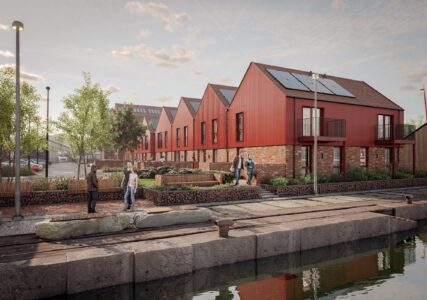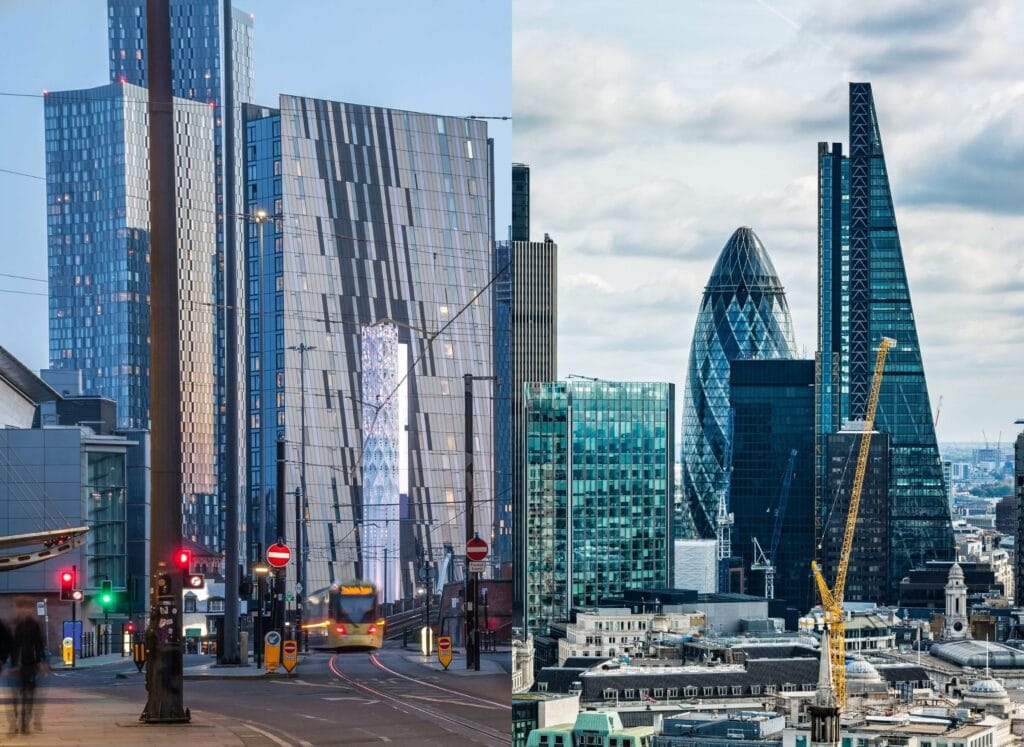As the gem of the north, Manchester is one of the must-watch locations for smart investors in the UK. With impressive projected growth across both sales and lettings, huge opportunities for new businesses, and a swathe of developments and regeneration in the pipeline, it’s no secret that Manchester is grabbing the attention of investors not just in the UK, but across the globe.
As home to huge business hubs such as Amazon, huge factories for Heinz and Astra-Zenica, Google’s only UK office outside of London, and the joint head office of ITV, it’s safe to say that Manchester attracts some of the most established organisations across the globe. And that’s not all â new businesses are flocking to the city, with Amazon and Microsoft being just two of the many businesses setting up in Manchester. The city’s reputation as a business and investment hub is creating new job opportunities, increased property demand and rising prices.
MANCHESTER PROPERTY PRICES IN 2024
As a northern city, investors needn’t worry about paying London prices for properties in Manchester. At the time of writing, properties sell for an average of £231,000 in the city, which is far more reasonable than in London where a property will set you back £723,000 on average.
Alongside Birmingham, Manchester is predicted by JLL to be the strongest city for house price growth until 2027. It is anticipated that Manchester will see the most impressive sales price growth of any UK city across 2024, with JLL estimating that prices will increase by 2.5%. This is particularly impressive considering that many property experts have indicated that the UK market will move slowly during 2024 â it seems as if Manchester will buck this trend and continue to provide investors with reliable growth.
Two boroughs of Greater Manchester to keep a close eye on if you are looking to invest in property are Salford and Oldham. Salford is currently undergoing extensive regeneration and has become a hub for media and the creative arts due to the large-scale projects at MediaCity. On the other hand, Oldham has seen the highest annual house price growth of the 10 Manchester boroughs, yet still offers affordable properties with an average selling price of just over £190,000. For those looking for a more premium investment, buy-to-let properties in Manchester City Centre always perform exceptionally well, with apartment rental prices in the city core having increased by 20% in the past year alone.
MANCHESTER RENTAL PRICES IN 2024
Predictions by JLL suggest that Manchester City Centre is set to be the location which will see the most dramatic rental value growth until 2027. Rental values are projected to see an average 4% boost every year until 2027, far exceeding the anticipated growth of other UK cities such as Liverpool and Bristol.
Rental yields across the city are already exceptionally high, with South Manchester’s M14 postcode generating yields of up to 9.5%. Similarly, properties in Salford, Pendleton, Moston and Clayton all generate yields of over 6% according to PropertyData. We anticipate that these areas of the city will become even more desirable for investors in 2024 and beyond. These price rises will be exacerbated by huge supply issues, with February 2023 seeing the lowest number of apartment listings available since 2019 at just 528. Just two years prior in February 2021, 2,216 apartments were available, indicating that tenants in Manchester are reluctant to move due to such fierce competition in the rental sector.
MANCHESTER SUPPLY AND DEMAND IN 2024
Manchester has experienced significant population growth since the start of the millennium. In fact, the number of inhabitants has soared from 422,000 to 600,000, and is anticipated to grow by a further 30,000 in the next six years. 100,000 people are due to live in the city centre alone by 2026, which makes city centre property a particularly sensible investment as this area is set to become increasingly in-demand with searching tenants and buyers.
Demand will also be impacted by the growing job market in the area, with 65,000 new jobs due to emerge in Manchester over the next few years as a result of its redevelopment efforts. This will increase employment in the city centre to 315,000 by 2040. This is a particularly impressive feat when you compare the city to other regions, as Manchester’s job growth is projected to double that of the north as a whole.
But will the city be able to provide housing for this growing population? It doesn’t seem likely â according to the Deloitte’s Crane Survey, 2,734 homes were delivered to the market over the last year in the city centre and central Salford. This is the only time in seven years that the number of completed properties has fallen. Although there are promising residential developments in the early stages of construction, and some nearing completion, it seems unlikely that these will be able to satiate the spectacularly high demand for property across Manchester.
MANCHESTER ECONOMIC FORECAST IN 2024
Recent predictions for economic growth across the UK suggests that Manchester will be the third fastest growing economy across the entire country, In fact, Manchester’s economy is expected to see annual average growth of 2.5% between 2024 and 2026, comfortably outpacing the national growth rate (2.1%). This will be a result of increased investment, ample redevelopment, sustainability efforts and job opportunities across the city core and Greater Manchester metropolitan area. We anticipate that businesses that have not already set up shop in this northern powerhouse will soon set their sights on doing so considering these impressive projections.
Even the Greater Manchester Index is improving. The Index, which measures the health of the region’s businesses, now sits at 30.3 â a significant improvement from its score of 17.8 in the final quarter of 2022. Manchester is showing no signs of slowing down, with investment continuing to flood into the city at an impressive rate and businesses continuing to put their faith in this truly impressive city. It’s no surprise that 80 of the FTSE 100 companies continue to have a presence in the city.
KEY DEVELOPMENTS DRIVING GROWTH IN MANCHESTER IN 2024
Manchester is no stranger to regeneration, with the city constantly undergoing ambitious redevelopment that continuously drives growth. There are an abundance of projects driving growth across the city, but there are four that stand out for the projected impact they are likely to have once completedâ¦
NOMA
NOMA, an abbreviation of North and Manchester, is the single largest redevelopment scheme in the north west. This 20 acre area in the centre of the city is due to create up to 6,000 jobs and will add £380 million per year to the economy. This will transcend commercial and residential spaces, but will span community and green spaces. Although much of the project has already been completed over the past decade, there is still work to be done to create this thriving new neighbourhood by 2029.
Spinningfields
The Spinningfields regeneration has been ongoing for two decades now, and has contributed significantly to Manchester’s business credentials and economy. The appeal of the region is two-fold â it has gained a reputation as the Canary Wharf of the North, but studies by Premier Inn show that Spinningfields is also regarded as the most family friendly part of Manchester. The area has created 10,000 new jobs and has already contributed £1 billion to the city’s economy, and shows no signs of stopping as redevelopment continues.
MediaCityUK
In 2016, MediaCityUK announced that it would be investing £1 billion over the next few years. This ambitious project will contribute significantly to the commercial and residential landscape, offering 2,000 new apartments and 540,000 square feet of office space, not to mention the retail and leisure capacity that will be made available. Although an abundance of jobs in construction, retail and from new business investment have been created by MediaCity, the most impressive feat is the 10,000 additional jobs that have been made in the digital sector following the BBC’s move to MediaCity.









